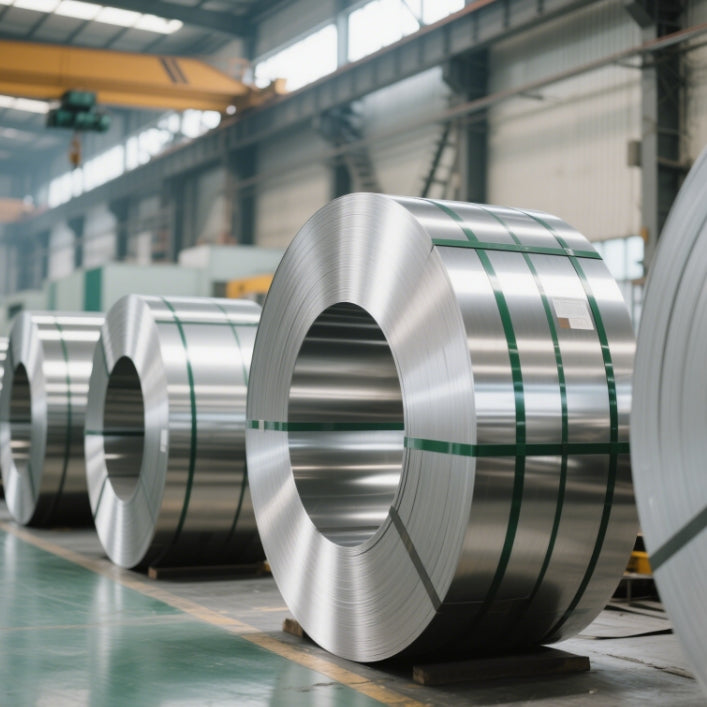StockSteel
Industrial 201/304 Stainless Steel Coil | Cold Rolled Reliability
Industrial 201/304 Stainless Steel Coil | Cold Rolled Reliability
Couldn't load pickup availability
Industrial 201/304 Stainless Steel Coil | Cold Rolled Reliability
Product Overview
| Property | 201 Stainless Steel Coil | 304 Stainless Steel Coil |
|---|---|---|
| Material Grade | ASTM A240, SUS201, EN 1.4372 | ASTM A240, SUS304, EN 1.4301 |
| Thickness | 0.02–3.0 mm | 0.1–20 mm |
| Width | 600–1500 mm | 10–2000 mm |
| Surface Finish | 2B, BA, Hairline, No.4, 8K, Embossed | 2B, BA, HL, Mirror, No.4 |
| Hardness | ≤183 HB | ≤187 HB (Annealed) |
| Tensile Strength | ≥450 MPa | 520–750 MPa |
| Yield Strength | ≥205 MPa | ≥290 MPa |
| Elongation | ≥22% | ≥40% |
| Density | 7.70 g/cm³ | 7.93 g/cm³ |
| Melting Point | 1427°C | 1400–1450°C |
| Processing | Cold/Hot Rolled, Slitting, Decorative Embossing | Cold/Hot Rolled, Welding, Cutting, Deep Drawing |
| Certifications | ASTM, JIS, GB/T | ISO 9001, SGS, RoHS |
Key Technical Specifications
Tensile & Bend Strength
The 201 stainless steel coil offers moderate tensile strength (≥450 MPa) and cost-effectiveness, making it ideal for decorative applications like kitchenware, automotive trim, and architectural accents. Its bend strength is enhanced by its ferritic structure, which resists cracking during forming.
The 304 stainless steel coil excels in high-stress environments due to its austenitic structure and higher nickel content (8–10.5%). With a tensile strength of 520–750 MPa, it withstands heavy loads in industrial equipment, food processing machinery, and chemical tanks. Its superior ductility (≥40% elongation) allows for deep drawing and complex fabrication.
For specialized needs, consider our 316 stainless steel coil stock, which adds 2–3% molybdenum for extreme corrosion resistance in marine and chemical environments.
Weight Calculation
Calculate coil weight using the formula:
Example: A 304 stainless steel coil (2mm thick, 1.5m wide, 100m long) weighs:
Identification Methods
- Chemical Analysis: Confirm Cr (16–18%) and Mn (5.5–7.5%) for 201 stainless steel; Cr (18–20%) and Ni (8–10.5%) for 304 stainless steel.
- Spark Testing: 201 generates bright, short sparks due to higher manganese; 304 produces fewer sparks with a reddish hue.
- Magnetic Testing: 201 is magnetic; 304 is non-magnetic unless cold-worked.
Causes of Stainless Steel Corrosion
- Chloride Exposure: Saltwater or de-icing salts penetrate passive oxide layers, causing pitting in 304 and 316L stainless steel coils.
- Galvanic Corrosion: Contact with dissimilar metals (e.g., carbon steel) in humid environments accelerates oxidation.
- Mechanical Damage: Scratches or grinding expose raw metal to oxygen and moisture.
- High-Temperature Oxidation: Prolonged exposure above 870°C degrades chromium’s protective oxide film.
- Organic Acid Accumulation: Food residues or chemicals in industrial settings form corrosive acids.
Advantages of Stainless Steel Coils
- Corrosion Resistance: Chromium (≥10.5%) forms a self-healing oxide layer, ideal for humid or chemical-heavy environments.
- Hygienic Surfaces: Non-porous finishes (e.g., 2B, BA) prevent bacterial growth, critical for food and medical industries.
- Aesthetic Versatility: Mirror, hairline, or embossed finishes suit architectural and decorative applications.
- Recyclability: 100% recyclable with minimal quality loss, aligning with sustainability goals.
- Thermal Stability: Retains strength at high temperatures, perfect for boilers and exhaust systems.
Why Choose Our Stainless Steel Coils?
- Global Certifications: ISO 9001, SGS, and RoHS compliance ensure unmatched quality.
- Custom Solutions: Tailored slitting, embossing, and polishing for 304, 201, and 316L stainless steel coils.
- Rapid Delivery: 7–15 days lead time with FOB, CIF, or EXW logistics support.
- Competitive Pricing: Direct partnerships with mills like TISCO and BAOSTEEL reduce costs without sacrificing performance.
- Technical Expertise: 20+ years of experience in alloy selection, fabrication, and corrosion prevention.

